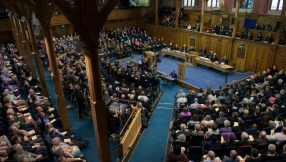A Game of Thrones actor has found a document in the Vatican archives that sheds light on a painful episode in the life of one of the Catholic Churches most controversial thinkers.
Paul Bentley, who plays the High Septon in the acclaimed HBO series – a figure analogous to the pope – was researching Jesuit priest and paleonotogist Pierre Teilhard de Chardin (1881-1955) for a play he was writing.

He came across the notorious 'Six Propositions' Teilhard was forced to sign by his highly conservative superiors in the Jesuit Order, who were worried about his views on original sin after he wrote a paper on the subject. He was also convinced of the truth of the theory of evolution, resisted at the time by the Church, and was to develop and influential evolutionary theology.
In 1925, Teilhard was given the choice of signing the 'Six Propositions' affirming conservative theology or leaving the Order. His agonising over the choice was the subject of the play by Bentley, who attended a Catholic school and is editor of the British Teilhard Network. However, until Bentley rediscovered them their contents were not known.
He spoke yesterday at a 'Six Propositions Day' conference at New College, Edinburgh, jointly organised with Dr David Grummett of Edinburgh University's School of Divinity, which included a reading of his play Inquisition.
According to the Scottish Catholic Observer, Bentley searched extensively for the document, eventually discovering it in the Jesuit archives in Rome.
'They are essentially six of the traditional teachings of the Church about Adam and Eve and Original Sin,' he said. 'He had to sign up to all six and he was prepared to sign five of the six, but the fourth proposition he felt he couldn't sign up to because, as a scientist, he didn't believe it was true.'
He said Teilhard 'agonised for months about what to do,' talking to a fellow priest before deciding to sign up to all six propositions.
Bentley found the documents after searching through 'folder after folder'. 'They actually photocopied it for me, so I was able to take it home, a photocopy of the actual six propositions, which are in Latin,' he said.
According to the Teilhard de Chardin website, he was able to find ways of agreeing to five of the Propositions, but the sixth caused him great difficulty. Convinced by his colleague Auguste Valensin, he signed it as 'a gesture of fidelity rather than as a symbol of intellectual assent'.













